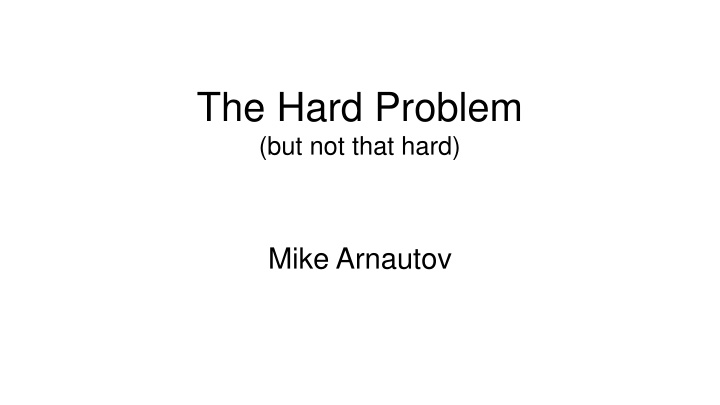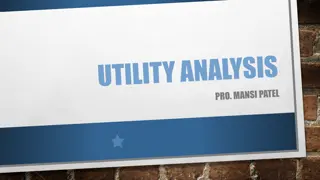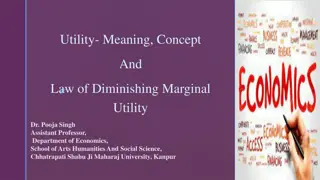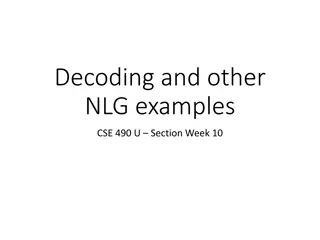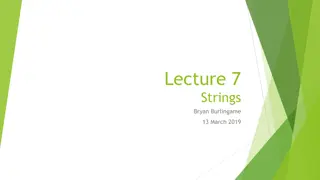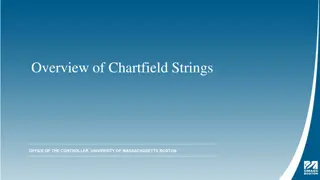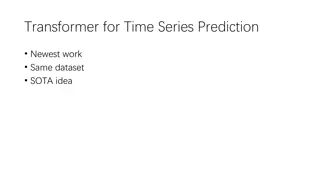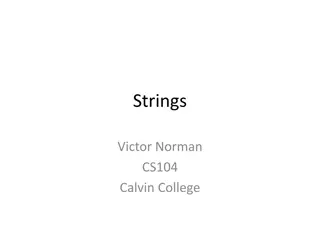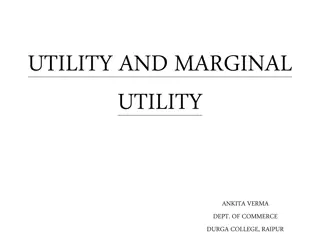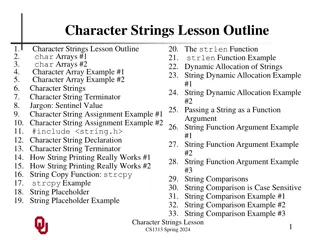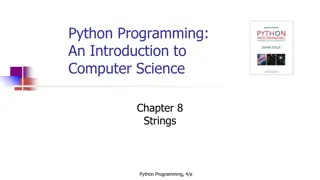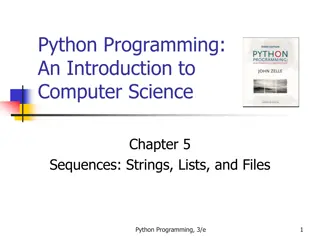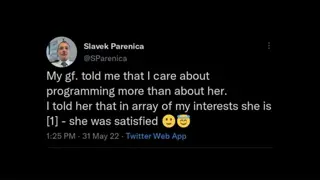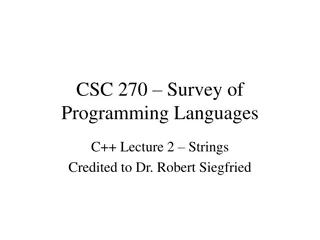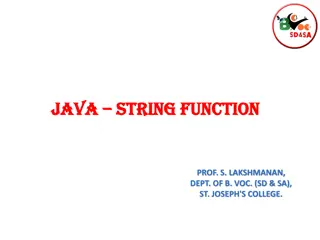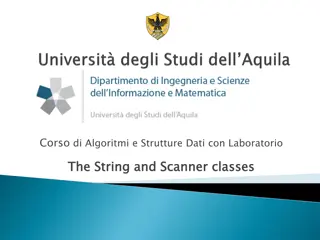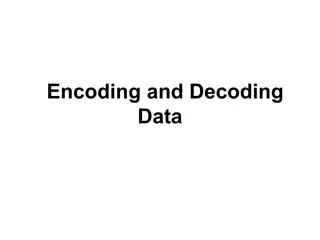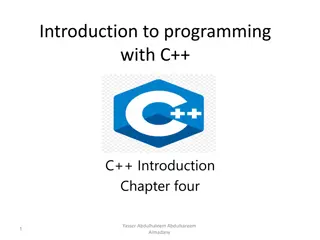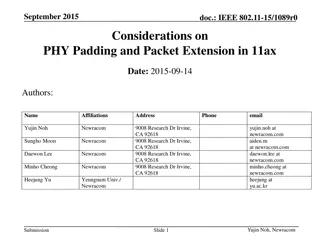Decoding URL Encoded Strings - Utility Class Overview
In this content, you can find information about a utility class designed for decoding URL encoded strings, along with code snippets and explanations related to downcasting parameters, obtaining normalized resource names, and more. The material covers various aspects of code duplication, padding, missing information, and comments at different levels. Explore the provided details for insights into handling strings, resource normalization, and code structuring practices.
Download Presentation

Please find below an Image/Link to download the presentation.
The content on the website is provided AS IS for your information and personal use only. It may not be sold, licensed, or shared on other websites without obtaining consent from the author.If you encounter any issues during the download, it is possible that the publisher has removed the file from their server.
You are allowed to download the files provided on this website for personal or commercial use, subject to the condition that they are used lawfully. All files are the property of their respective owners.
The content on the website is provided AS IS for your information and personal use only. It may not be sold, licensed, or shared on other websites without obtaining consent from the author.
E N D
Presentation Transcript
The Hard Problem (but not that hard) Mike Arnautov
Stanford Encyclopedia of Philosophy: ...the so-called hard problem (Chalmers 1995) which is more or less that of giving an intelligible account that lets us see in an intuitively satisfying way how phenomenal or what it's like consciousness might arise from physical or neural processes in the brain.
Stanford Encyclopedia of Philosophy: ...the so-called hard problem (Chalmers 1995) which is more or less that of giving an intelligible account that lets us see in an intuitively satisfying way how phenomenal or what it's like consciousness might arise from physical or neural processes in the brain.
Stanford Encyclopedia of Philosophy: ...the so-called hard problem (Chalmers 1995) which is more or less that of giving an intelligible account that lets us see in an intuitively satisfying way how phenomenal or what it's like consciousness might arise from physical or neural processes in the brain.
Stanford Encyclopedia of Philosophy: ...the so-called hard problem (Chalmers 1995) which is more or less that of giving an intelligible account that lets us see in an intuitively satisfying way how phenomenal or what it's like consciousness might arise from physical or neural processes in the brain. Current physics?
Stanford Encyclopedia of Philosophy: ...the so-called hard problem (Chalmers 1995) which is more or less that of giving an intelligible account that lets us see in an intuitively satisfying way how phenomenal or what it's like consciousness might arise from physical or neural processes in the brain. Current physics? Completed physics?
Main Hard Problem arguments Phenomenal consciousness and qualia Philosophical zombies
Qualia (singular: quale) qualities of phenomenal experience the 'what it is like' character of mental states the introspectively accessible, specific something making e.g. perception of red colour what it is
Stanford on qualia phenomenal character of experience properties of sense data intrinsic, non-representational properties intrinsic, non-physical, ineffable properties
Thought experiment 1 Mary, the shockingly mistreated colour scientist
Thought experiment 1 Mary, the shockingly mistreated colour scientist Knowing all there is to know scientifically, Mary still learns something new on seeing a red rose. R.I.P. physicalism.
First objection: Practicalities of eliminating colour experience
First objection: Practicalities of eliminating colour experience Trivially answered?
The strange case of Martian Colours
The strange case of Martian Colours A colour-blind patient
The strange case of Martian Colours A colour-blind patient who happens to be synaesthetic!
The strange case of Martian Colours A colour-blind patient who happens to be synaesthetic! Does his brain manufacture qualia?
Second objection: What Mary learns is specific to her
Second objection: What Mary learns is specific to her Uniqueness of individual brains and experiences
What-it-is-like of experience Why does red look like red?
What-it-is-like of experience Why does red look like red? Well, how else should it look?
Evolutionary purposes of experience Experiences have to be differentiated
Evolutionary purposes of experience Experiences have to be differentiated Experiences do not present themselves
But why conscious experience? That s a good question Does intelligence require consciousness?
What is consciousness? Access consciousness and phenomenal consciousness
Thought experiment 2 Philosophical zombies
Thought experiment 2 Philosophical zombies (Die, zombie, die!!)
Zombies are just like humans in all physical and behavioural aspects, but lack phenomenal consciousness
Zombies are just like humans in all physical and behavioural aspects, but lack phenomenal consciousness They are imaginable therefore (?) they are possible R.I.P. physicalism
Objection 1 Since when does imaginability entails possibility?
Objection 1 Since when does imaginability entails possibility? Why is it so difficult to find counter-examples?
Objection 2: question begging Physical characteristics of a human are insufficient to produce phenomenal experience
Objection 2: question begging Physical characteristics of a human are insufficient to produce phenomenal experience Inverting the argument leads to the opposite conclusion
Objection 3: How do I know my listeners are not zombies?
Objection 3: How do I know my listeners are not zombies? How do I know I am not a zombie?
Chalmers response: Zombies believe they are not zombies but their belief is false
Chalmers response: Zombies believe they are not zombies but their belief is false It lacks the validating direct experience of phenomenal consciousness
Suppose I am a zombie If Chalmers waves a magic wand to de-zombify me
Suppose I am a zombie If Chalmers waves a magic wand to de-zombify me What would change?
In summary: the zombie argument Conflates conceivable with possible Begs the question Appears to reduce to mere semantics Assumes privilege of direct experience
If the direct experience claim is wrong, are there any alternative proposals?
If the direct experience claim is wrong, are there any alternative proposals? My favourite: Global Working Space (badly misnamed)
Consciousness should be thought of in terms of competition between non-conscious subsystems for a limited capacity, which broadcasts information for wide access and use
Extreme version: Consciousness has no executive powers
Extreme version: Consciousness has no executive powers (but I am still in charge!)
